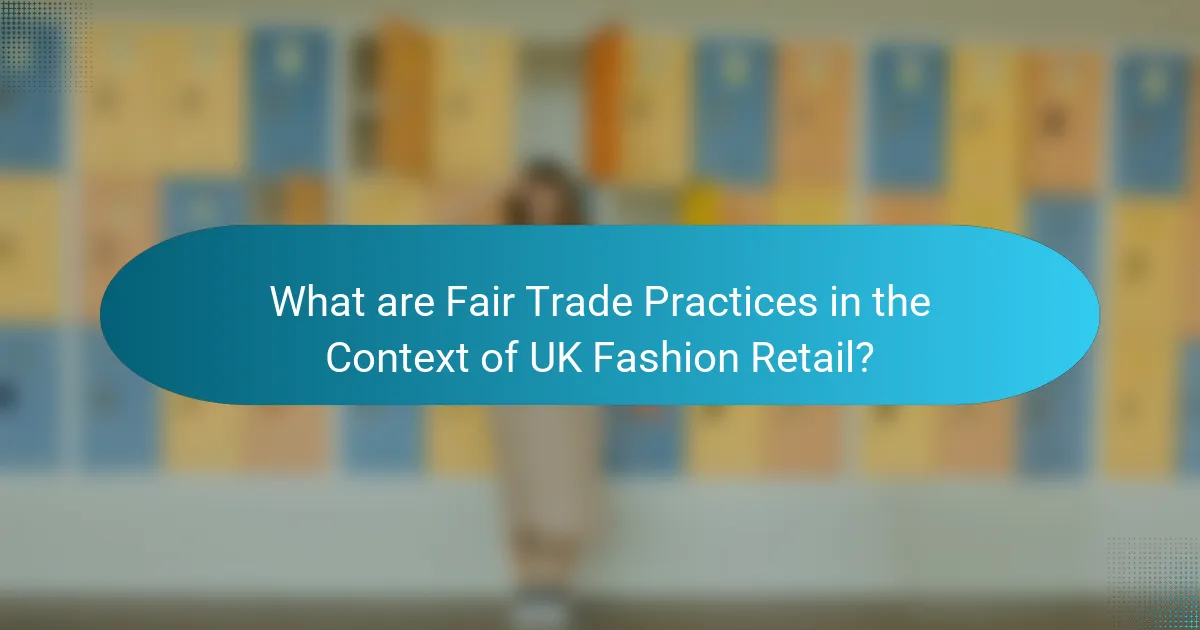
What are Fair Trade Practices in the Context of UK Fashion Retail?
Fair trade practices in the context of UK fashion retail ensure ethical sourcing and production standards. These practices promote fair wages for workers and safe working conditions. They also prioritize sustainable materials and environmentally friendly production methods. In the UK, many brands are certified by organizations such as Fair Trade Foundation. This certification guarantees compliance with fair trade principles. Research shows that fair trade practices can improve the livelihoods of producers. According to the Fair Trade Foundation, certified producers earn up to 25% more than non-certified ones. These practices also enhance consumer awareness and demand for ethical fashion. As a result, fair trade has become an integral part of the UK fashion retail landscape.
How do Fair Trade Practices differ from conventional retail practices?
Fair Trade Practices prioritize ethical treatment and compensation for producers, while conventional retail practices often focus on profit maximization. Fair Trade ensures that producers receive a fair wage, which is typically above the market rate. This practice promotes sustainable farming and environmental stewardship. In contrast, conventional retail may exploit lower labor costs to reduce prices. Fair Trade also emphasizes direct trade relationships, reducing the number of intermediaries. This fosters transparency and accountability in the supply chain. Conventional retail often lacks such transparency, which can lead to exploitation. Fair Trade certification requires adherence to specific social and environmental standards. Conventional retail does not universally enforce such standards, leading to potential ethical issues.
What key principles define Fair Trade Practices?
Fair Trade Practices are defined by principles that promote equitable trade relationships. These principles include fair wages for producers, ensuring safe working conditions, and sustainable environmental practices. Fair Trade also emphasizes transparency in supply chains and the empowerment of marginalized communities. Certification organizations, such as Fair Trade International, enforce these standards, ensuring compliance. This framework supports long-term trade relationships that benefit both producers and consumers. Fair Trade practices aim to reduce poverty and enhance livelihoods through ethical consumption.
Why are Fair Trade Practices essential for ethical fashion?
Fair Trade Practices are essential for ethical fashion because they ensure fair wages and safe working conditions for workers. These practices promote sustainable livelihoods in developing countries. They also encourage transparency in the supply chain. Fair Trade certification requires adherence to strict environmental and labor standards. This leads to reduced exploitation of workers and better quality products. According to the World Fair Organization, Fair Trade can increase farmers’ income by 30% on average. Ethical fashion brands that adopt Fair Trade practices gain consumer trust. This trust is vital in a market increasingly focused on sustainability and ethical sourcing.
What impact do Fair Trade Practices have on the UK fashion industry?
Fair Trade Practices significantly enhance ethical standards in the UK fashion industry. These practices promote fair wages and safe working conditions for garment workers. They also encourage sustainable sourcing of materials, reducing environmental impact. As a result, consumer awareness and demand for ethical fashion have increased. This shift has led many brands to adopt Fair Trade certification. In 2022, the UK saw a 20% rise in Fair Trade fashion sales. Such growth reflects a broader commitment to social responsibility among consumers. Overall, Fair Trade Practices are reshaping the industry’s approach to ethics and sustainability.
How do Fair Trade Practices influence consumer behavior?
Fair Trade Practices significantly influence consumer behavior by enhancing ethical purchasing decisions. Consumers are increasingly aware of social and environmental issues. They prefer products that align with their values, such as fair wages and sustainable practices. A 2019 study by the Fair Trade Foundation reported that 72% of UK consumers are willing to pay more for Fair Trade products. This willingness reflects a growing trend towards conscious consumption. Additionally, brands that adopt Fair Trade practices often see increased customer loyalty. Ethical branding resonates with consumers, leading to positive purchasing patterns. Thus, Fair Trade Practices shape a more responsible consumer market.
What are the economic benefits of Fair Trade Practices for producers?
Fair Trade Practices provide significant economic benefits for producers. These practices ensure that producers receive fair prices for their goods. Fair prices lead to increased income stability for farmers and artisans. This stability allows them to invest in their businesses and communities. Fair Trade also promotes long-term trading relationships. These relationships can lead to better market access and reduced vulnerability to price fluctuations. According to the Fair Trade Foundation, producers often earn up to 30% more than conventional trade. This additional income can be used for education, healthcare, and improving living conditions. Overall, Fair Trade Practices enhance the economic well-being of producers significantly.
What challenges do Fair Trade Practices face in UK Fashion Retail?
Fair Trade Practices in UK Fashion Retail face several challenges. One significant challenge is consumer awareness. Many consumers lack knowledge about what Fair Trade entails. This results in lower demand for Fair Trade products. Another challenge is price sensitivity. Fair Trade items often cost more due to ethical sourcing practices. This can deter budget-conscious shoppers. Additionally, supply chain transparency poses difficulties. Brands may struggle to verify Fair Trade claims throughout their supply chains. Market competition also plays a role. Fast fashion brands dominate the market with lower prices and quicker turnaround times. This can overshadow Fair Trade alternatives. Lastly, regulatory frameworks are inconsistent. This leads to confusion about Fair Trade standards and certifications. These challenges collectively hinder the growth of Fair Trade practices in UK fashion retail.
How do supply chain complexities affect Fair Trade implementation?
Supply chain complexities significantly hinder Fair Trade implementation. They create challenges in monitoring compliance with Fair Trade standards. Complex supply chains often involve multiple intermediaries, which can obscure transparency. This lack of transparency makes it difficult to ensure ethical sourcing practices. Additionally, logistical issues can delay the delivery of Fair Trade products. These delays can affect pricing and availability in the market. Research indicates that over 70% of Fair Trade organizations report issues related to supply chain management. Effective Fair Trade implementation requires streamlined supply chains for better oversight and accountability.
What role does consumer awareness play in promoting Fair Trade?
Consumer awareness is crucial in promoting Fair Trade. Informed consumers are more likely to choose ethically sourced products. They understand the benefits of Fair Trade, such as fair wages for producers and sustainable practices. Increased awareness leads to higher demand for Fair Trade products. This demand encourages retailers to stock and promote Fair Trade items. Research shows that consumer preferences can shift market dynamics. A 2021 study by the Fair Trade Foundation found that 70% of consumers prefer brands with Fair Trade certification. Thus, consumer awareness directly influences the growth and visibility of Fair Trade in the market.

What are the Real-World Applications of Fair Trade Practices?
Fair trade practices have real-world applications in various sectors, including fashion retail. They ensure ethical sourcing of materials, promoting sustainable production methods. Fair trade practices support marginalized producers by providing fair wages and improving working conditions. They also foster consumer awareness about the origins of products. In the UK fashion retail sector, brands that adopt fair trade practices often see enhanced brand loyalty. This commitment to ethical standards can lead to increased sales and market share. Additionally, fair trade certifications can attract socially conscious consumers. Overall, fair trade practices contribute to a more equitable global trade system.
What are some successful case studies of Fair Trade in UK fashion?
Successful case studies of Fair Trade in UK fashion include brands like People Tree and Nomads. People Tree, established in 1991, pioneered Fair Trade fashion in the UK. They collaborate with Fair Trade producers in developing countries. Their commitment ensures fair wages and safe working conditions. People Tree’s garments are certified by the World Fair Organization. Nomads focuses on ethical sourcing and sustainability. They emphasize fair wages for artisans and workers. Nomads also supports community development projects. These brands demonstrate the positive impact of Fair Trade in the UK fashion industry. Their success highlights consumer demand for ethical fashion options.
How have specific brands implemented Fair Trade Practices effectively?
Brands such as People Tree and Stella McCartney have effectively implemented Fair Trade practices. People Tree sources organic cotton from Fair Trade certified farmers. This ensures fair wages and safe working conditions. Stella McCartney emphasizes ethical sourcing and transparency in her supply chain. She partners with organizations that uphold Fair Trade standards. Both brands prioritize sustainability and social responsibility. They demonstrate that ethical practices can coexist with profitability. According to the Fair Trade Foundation, these practices have increased consumer trust and brand loyalty.
What lessons can be learned from these case studies?
Case studies on fair trade practices in UK fashion retail reveal several key lessons. Firstly, transparency in supply chains builds consumer trust. Brands that disclose sourcing practices often see increased customer loyalty. Secondly, ethical labor practices enhance brand reputation. Companies that prioritize fair wages and safe working conditions attract socially conscious consumers. Thirdly, collaboration with local communities leads to sustainable sourcing. Engaging local artisans fosters economic growth and preserves cultural heritage. Lastly, measurable impact metrics are crucial for accountability. Brands that track their social and environmental contributions can better communicate their value to consumers. These lessons underscore the importance of ethical practices in enhancing brand success and consumer relationships.
How do Fair Trade certifications impact brand reputation?
Fair Trade certifications significantly enhance brand reputation. Brands that obtain Fair Trade certifications are perceived as socially responsible. This perception can lead to increased customer loyalty. Consumers often prefer brands that support ethical practices. Research shows that 66% of global consumers are willing to pay more for sustainable brands. Fair Trade certifications also differentiate brands in a competitive market. They signal commitment to fair labor practices and environmental sustainability. This commitment can improve public relations and brand image. Overall, Fair Trade certifications positively influence consumer trust and brand loyalty.
What are the most recognized Fair Trade certifications in the UK fashion industry?
The most recognized Fair Trade certifications in the UK fashion industry are Fair Trade International, the Global Organic Textile Standard (GOTS), and the Ethical Trading Initiative (ETI). Fair Trade International certifies products that meet specific social, economic, and environmental standards. GOTS focuses on organic textiles and includes criteria for social responsibility. The ETI promotes respect for workers’ rights and ethical labor practices. These certifications ensure transparency and accountability in the fashion supply chain. Their recognition highlights the commitment to ethical sourcing and sustainable practices within the UK fashion industry.
How do certifications influence consumer trust and purchasing decisions?
Certifications significantly enhance consumer trust and influence purchasing decisions. They serve as credible indicators of quality, safety, and ethical practices. For example, Fair Trade certifications assure consumers that products meet specific ethical standards. Research indicates that 66% of consumers are willing to pay more for brands committed to social responsibility. Certifications also differentiate products in a crowded market, guiding consumers toward informed choices. A study by Nielsen found that 55% of global online consumers are willing to pay extra for sustainable brands. Therefore, certifications play a crucial role in building trust and driving sales in the fashion retail sector.

What are the Future Trends for Fair Trade Practices in UK Fashion Retail?
Future trends for fair trade practices in UK fashion retail include increased consumer demand for transparency. Consumers are becoming more aware of ethical sourcing and sustainability. This awareness drives brands to adopt fair trade certifications. Additionally, technology is enhancing traceability in supply chains. Blockchain and digital platforms are being utilized to verify fair trade claims. Collaboration between brands and fair trade organizations is also on the rise. This partnership promotes ethical practices and boosts brand credibility. Furthermore, younger consumers prioritize sustainability, influencing brands to align with fair trade values. Research shows that 66% of global consumers are willing to pay more for sustainable brands.
How is technology shaping the future of Fair Trade in fashion?
Technology is shaping the future of Fair Trade in fashion by enhancing transparency and efficiency in supply chains. Blockchain technology allows for real-time tracking of products from production to retail. This ensures that Fair Trade practices are adhered to at every stage. Additionally, digital platforms connect consumers directly with Fair Trade producers. This fosters greater awareness and support for ethical practices. Data analytics helps brands understand consumer preferences for sustainable fashion. As a result, brands can tailor their offerings to meet ethical demands. Innovations in textile production reduce waste and promote sustainable materials. Overall, technology empowers consumers and producers to engage in Fair Trade practices effectively.
What innovations are emerging to support Fair Trade Practices?
Innovations supporting Fair Trade practices include blockchain technology, which enhances transparency in supply chains. This technology allows consumers to trace the origin of products. Another innovation is mobile payment systems that facilitate direct transactions between producers and consumers. This reduces transaction costs and increases profits for producers. Additionally, eco-friendly materials are being developed to promote sustainable production methods. These materials often come from certified Fair Trade sources. There is also a rise in social enterprises focused on ethical sourcing and fair labor practices. These enterprises prioritize community welfare alongside profit. Finally, digital platforms are emerging to connect consumers directly with Fair Trade producers, fostering a more equitable marketplace.
How can brands leverage technology to enhance transparency?
Brands can leverage technology to enhance transparency by utilizing blockchain and data analytics. Blockchain provides an immutable record of transactions, ensuring traceability in supply chains. This technology allows consumers to verify the origin of materials and labor conditions. Data analytics can assess and share sustainability metrics in real-time. Brands can use apps to communicate ethical practices directly to consumers. According to a 2021 study by McKinsey, 66% of consumers prefer brands that are transparent about their supply chains. Implementing these technologies not only builds trust but also aligns with growing consumer demand for ethical practices.
What practical steps can consumers take to support Fair Trade in fashion?
Consumers can support Fair Trade in fashion by choosing brands that are certified Fair Trade. This ensures that the workers involved are paid fairly and work in safe conditions. Research indicates that Fair Trade practices can improve the livelihoods of producers significantly. Consumers should also look for transparency in supply chains. Brands that disclose their sourcing practices are more likely to adhere to Fair Trade standards. Additionally, purchasing second-hand clothing reduces demand for fast fashion, which often exploits workers. Engaging in advocacy for Fair Trade policies can further influence industry standards. Finally, educating others about the benefits of Fair Trade in fashion can create a broader impact.
How can consumers identify Fair Trade products when shopping?
Consumers can identify Fair Trade products by looking for specific certification labels. These labels include the Fair Trade Certified mark and the Fair Trade International logo. Products with these certifications meet strict social, economic, and environmental standards. Fair Trade certification ensures fair wages and safe working conditions for producers. Additionally, consumers can research brands committed to Fair Trade practices. Many brands provide transparency about their sourcing and production processes. Online resources and apps also list Fair Trade certified products. This information helps consumers make informed purchasing decisions.
What are some best practices for promoting Fair Trade in everyday life?
Purchase Fair Trade certified products. This supports ethical practices and fair wages for producers. Choose local Fair Trade shops or online retailers. This helps reduce carbon footprints and promotes community engagement. Educate yourself and others about Fair Trade. Understanding its impact fosters advocacy and informed purchasing decisions. Share information on social media platforms. This raises awareness and encourages others to support Fair Trade. Participate in Fair Trade events and campaigns. Engaging in community activities strengthens the Fair Trade movement. Advocate for Fair Trade policies. Support legislation that promotes fair labor practices in trade.
Fair trade practices are essential in the context of UK fashion retail, promoting ethical sourcing, fair wages, and sustainable production methods. This article outlines the key principles of fair trade, its differences from conventional retail practices, and the significant impact these practices have on the fashion industry and consumer behavior. It highlights successful case studies of brands implementing fair trade, the economic benefits for producers, and the challenges faced in promoting fair trade in the UK market. Additionally, the article discusses the role of technology in enhancing transparency and consumer awareness, along with practical steps consumers can take to support fair trade initiatives.



